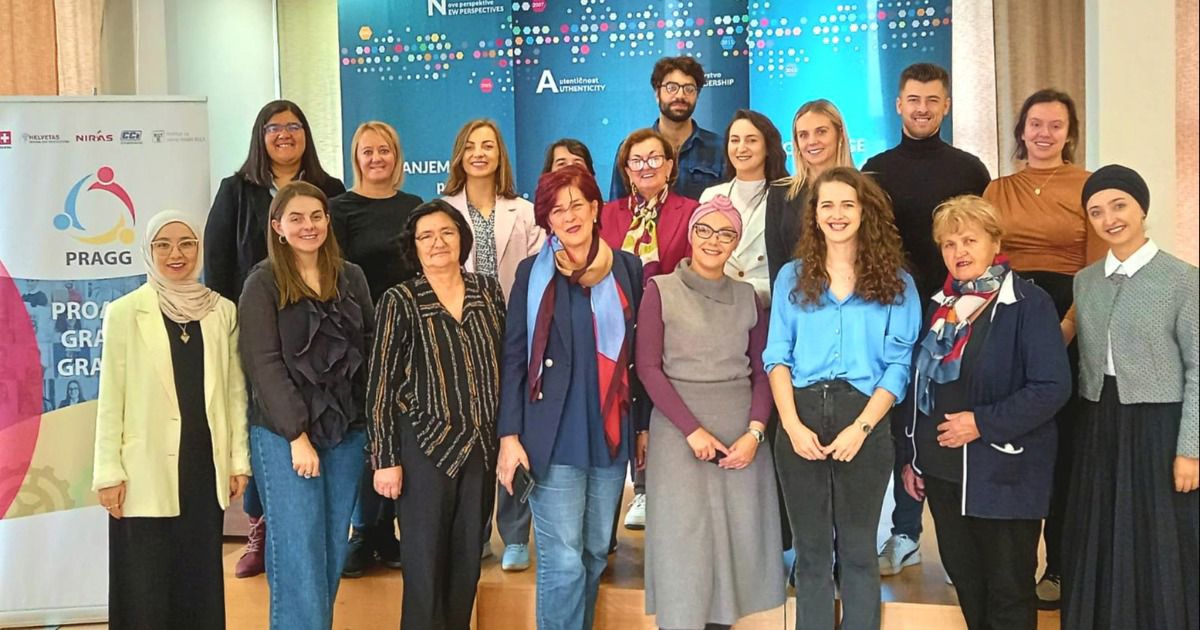
Numerous non-governmental organizations from across Bosnia and Herzegovina, which work daily on various important issues, visited the Center for Education and Research “Nahla,” the host of the third study visit organized within the PRAGG project. The focus of the visit was on adult education programs, models of cooperation with employers, and the challenges and opportunities for sustainability within the NGO sector.
Nahla’s accredited programs in administration, accounting, data science, and other fields provide a pathway to professional empowerment and real employment. Through these programs, more than 50 women who completed Nahla’s training have successfully connected with employers, demonstrating that the programs offer real opportunities rather than just theoretical knowledge.
“As an organization, we are committed to continuously sharing knowledge - not only with our beneficiaries but also within the non-governmental sector. Unfortunately, we lack a perfect legal framework, which is why it’s important to support one another. During gatherings like this, we hear a variety of perspectives, challenges, as well as concrete solutions and ways to successfully address them,” said Sehija Dedović, President of CEI Nahla.
The participation of representatives from NGOs engaged in entirely different fields during this study visit highlights how the civil sector fills gaps in society that other institutions struggle to reach. These are often very specific “small niches” with themes and target groups that would otherwise be forgotten or insufficiently protected.
However, Dedović warns that statistics paint a sobering picture. Since the 1990s, 27,000 NGOs have been registered in Bosnia and Herzegovina. Of that number, about 17,500 are active, yet the total number of employed persons in the sector is just over 8,000.
“For me, that is a discouraging fact. It means that in the NGO sector, most people either volunteer, work elsewhere, are not formally employed, or work on temporary contracts. These figures clearly show the sector’s lack of capacity and its inability to plan and implement the long-term changes that are truly needed,” Dedović emphasized.
Representatives of the association Women for Women International, Džana Pašić and Nermana Deljkić, who took part in the visit, said that the exchange of experiences and good practices they witnessed showed that it is possible - though often very challenging - to think strategically about long-term sustainability and the positioning of organizations in today’s uncertain times.
“We sincerely thank and welcome the initiative to organize such a meeting. Amid the many fantastic activities that organizations across BiH carry out daily, it is rare to find time for genuine networking and joint reflection on the future of the sector,” they said.
During the sessions, attended by around 20 participants from Banja Luka, Sarajevo, Srbac, Travnik, Lukavac, Tuzla, and Mostar, discussions focused on the self-sustainability of associations—what income from own activities means for an organization, when it can be generated independently, and when through a separate legal entity; the challenges along that path; the need for fiscalization; and the possibilities for registered companies to offer additional services beyond their primary scope of work.
This third study visit organized under the PRAGG project demonstrated how vital the synergy between NGOs, educational institutions, and employers is in achieving sustainable change. Adult education and professional orientation are not only a form of support for individual development - they are the foundation for stronger, fairer, and more economically sustainable communities.
The visit was organized within the PRAGG project, funded by the Government of Switzerland and implemented by a consortium comprising HELVETAS and NIRAS in Bosnia and Herzegovina, in partnership with local partners—the Centers for Civic Initiatives (CCI) and the Institute for Youth Development KULT.




